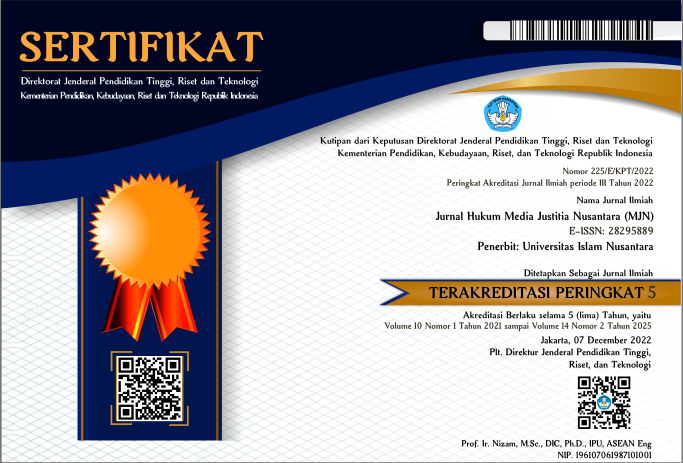ANALISA PENERAPAN PUTUSAN ULTRA PETITA OLEH MAHKAMAH KONSTITUSI DALAM PUTUSAN PERSELISIHAN HASIL PEMILIHAN UMUM
DOI:
https://doi.org/10.30999/mjn.v13i1.2614Abstract
The Constitutional Court is a particular judicial state institutions that has a position as a judicial institution besides the Supreme Court. Their responsibilities and power are controlled in Article 24C paragraph (1) of the 1945 Constitution of the Republic of Indonesia, where one of them is determining disputes over the outcome of the presidential elections. Requests for these types of issues may only be submitted by election participants considering the rules and regulations provided in Law no. 24 of 2003. In giving a decision, the judge has the right to find his own law, including giving a decision that exceeds the application submitted by the applicant which is called a decisionultra small. This is intended to provide substantive justice to the applicants. The objective of doing this research is to analyze whether the decisionultra smallcan be applied in the issue of disputes over election results. For this reason, , a normative research was conducted using a qualitative methodology so that the results provided are a comprehensive discussion. The outcomes from this research prove that the verdictultra smallcan be given to cases of disputed election results. Example of applicationultra small against the action of the Constitutional Court is the Constitutional Court Decision Number 41/PHPU.D-VI/2008 and the Constitutional Court Decision Number 57/PHPU.D-VI/2008.
Keywords:ultra petita, verdict, election dispute
References
Almalibari, K. T., Aziz, A., & Febriansyah, A. (2019). Kewenangan Mahkamah Konstitusi Dalam Sistem Pemilihan Umum. Jurnal Rechten: Riset Hukum Dan Hak Asasi Manusia, 1(2), 38–45
Asshiddiqie, J. (2006). Pengantar Ilmu Hukum Tata Negara Jilid I. Jakarta: Sekretariat Jenderal dan Kepaniteraan Mahkamah Konstitusi
Asshiddiqie, J. (2012). Sejarah Constitutinal Review dan Gagasan Pembentukan Mahkamah Konstitus
Harun, R. (2016). Rekonstruksi Kewenangan Penyelesaian Perselisihan Hasil Pemilihan Umum. Jurnal Konstitusi, 13(1), 1–24
Helmi, M. (2020). Penemuan Hukum oleh Hakim Berdasarkan Paradigma Konstruktivisme. Kanun Jurnal Ilmu Hukum, 22(1), 111–132
Jimly, A. (2010). Hukum Acara Pengujian Undang-Undang. Jakarta: Sinar Grafika.
Nugraha, F. K. (2016). Peran Mahkamah Konstitusi (MK) dalam Sengketa Pemilu Kepala Daerah (Pilkada). Jurnal Transformative, 2(1), 58–74.
Rosidin, U., & Rusdiana, H. . (2018). Pengantar Hukum Acara Mahkamah Konstitusi. Bandung: Pustaka Setia.
Rubaie, A., Nurjaya, N., Ridwan, M., & Istislam. (2014). Putusan Ultra Petita Mahkamah Konstitusi. Jurnal Konstitusi, 11(1), 85–108.
Sitohang, R. T., & Abra, E. H. (2021). Ultra Petita dalam Putusan Pemilihan Kepala Daerah pada Mahkamah Konstitusi. Jurnal Unrika, 3(1), 136–148.
Sunarto. (2016). Prinsip Checks and Balances dalam Sistem Ketatanegaraan Indonesia. Jurnal Masalah-Masalah Hukum, 45(2), 157–163.
Syahuri, T. (2009). Putusan Mahkamah Konstitusi tentang Perselisihan Hasil Perhitungan Suara Pemilihan Umum Berdasarkan Undang-Undang No. 24 Tahun 2003. Jurnal Konstitusi PKK-FH Universitas Bengkulu, 2(1).
Downloads
Published
How to Cite
Issue
Section
Citation Check
License
Copyright (c) 2023 JURNAL HUKUM MEDIA JUSTITIA NUSANTARA (MJN)

This work is licensed under a Creative Commons Attribution-NonCommercial-NoDerivatives 4.0 International License.











